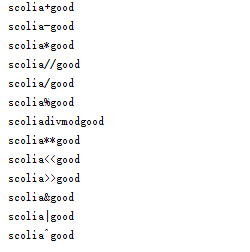python魔法方法-单目运算及一般算数运算
2016-07-18 17:16
656 查看
在比较的魔法方法中,我们讨论了魔法方法其实就是重载了操作符,例如>、<、==等。而这里,我们继续讨论有关于数值的魔法方法。
实现一个取正数的操作(比如 +some_object ,python调用__pos__函数)
__neg__(self)
实现一个取负数的操作(比如 -some_object )
__abs__(self)
实现一个内建的abs()函数的行为
__invert__(self)
实现一个取反操作符(~操作符)的行为。
__round__(self, n)
实现一个内建的round()函数的行为。 n 是待取整的十进制数.(貌似在2.7或其他新版本中废弃)
__floor__(self)
实现math.floor()的函数行为,比如, 把数字下取整到最近的整数.(貌似在2.7或其他新版本中废弃)
__ceil__(self)
实现math.ceil()的函数行为,比如, 把数字上取整到最近的整数.(貌似在2.7或其他新版本中废弃)
__trunc__(self)
实现math.trunc()的函数行为,比如, 把数字截断而得到整数.

实现一个加法.
__sub__(self, other)
实现一个减法.
__mul__(self, other)
实现一个乘法.
__floordiv__(self, other)
实现一个“//”操作符产生的整除操作
__div__(self, other)
实现一个“/”操作符代表的除法操作.(因为Python 3里面的division默认变成了true division,__div__在Python3中不存在了)
__truediv__(self, other)
实现真实除法,注意,只有当你from __future__ import division时才会有效。
__mod__(self, other)
实现一个“%”操作符代表的取模操作.
__divmod__(self, other)
实现一个内建函数divmod()
__pow__
实现一个指数操作(“**”操作符)的行为
__lshift__(self, other)
实现一个位左移操作(<<)的功能
__rshift__(self, other)
实现一个位右移操作(>>)的功能.
__and__(self, other)
实现一个按位进行与操作(&)的行为.
__or__(self, other)
实现一个按位进行或操作(|)的行为.
__xor__(self, other)
实现一个异或操作(^)的行为


欢迎大家交流
参考资料:戳这里
1.单目运算符或单目运算函数
__pos__(self)实现一个取正数的操作(比如 +some_object ,python调用__pos__函数)
__neg__(self)
实现一个取负数的操作(比如 -some_object )
__abs__(self)
实现一个内建的abs()函数的行为
__invert__(self)
实现一个取反操作符(~操作符)的行为。
__round__(self, n)
实现一个内建的round()函数的行为。 n 是待取整的十进制数.(貌似在2.7或其他新版本中废弃)
__floor__(self)
实现math.floor()的函数行为,比如, 把数字下取整到最近的整数.(貌似在2.7或其他新版本中废弃)
__ceil__(self)
实现math.ceil()的函数行为,比如, 把数字上取整到最近的整数.(貌似在2.7或其他新版本中废弃)
__trunc__(self)
实现math.trunc()的函数行为,比如, 把数字截断而得到整数.
class Foo(str):
def __new__(cls, x, *args, **kwargs):
return super(Foo, cls).__new__(cls, x)
def __init__(self, x):
self.x = x
def __pos__(self):
return '+' + self.x
def __neg__(self):
return '-' + self.x
def __abs__(self):
return 'abs:' + self.x
def __invert__(self):
return 'invert:' + self.x
a = Foo('scolia')
print +a
print -a
print ~a
2.一般算数运算
__add__(self, other)实现一个加法.
__sub__(self, other)
实现一个减法.
__mul__(self, other)
实现一个乘法.
__floordiv__(self, other)
实现一个“//”操作符产生的整除操作
__div__(self, other)
实现一个“/”操作符代表的除法操作.(因为Python 3里面的division默认变成了true division,__div__在Python3中不存在了)
__truediv__(self, other)
实现真实除法,注意,只有当你from __future__ import division时才会有效。
__mod__(self, other)
实现一个“%”操作符代表的取模操作.
__divmod__(self, other)
实现一个内建函数divmod()
__pow__
实现一个指数操作(“**”操作符)的行为
__lshift__(self, other)
实现一个位左移操作(<<)的功能
__rshift__(self, other)
实现一个位右移操作(>>)的功能.
__and__(self, other)
实现一个按位进行与操作(&)的行为.
__or__(self, other)
实现一个按位进行或操作(|)的行为.
__xor__(self, other)
实现一个异或操作(^)的行为
class Foo(str):
def __new__(cls, x, *args, **kwargs):
return super(Foo, cls).__new__(cls, x)
def __init__(self, x):
self.x = x
def __add__(self, other):
return self.x + '+' + other.x
def __sub__(self, other):
return self.x + '-' + other.x
def __mul__(self, other):
return self.x + '*' + other.x
def __floordiv__(self, other):
return self.x + '//' + other.x
def __div__(self, other):
return self.x + '/' + other.x
def __truediv__(self, other):
return self.x + 't/' + other.x
def __mod__(self, other):
return self.x + '%' + other.x
def __divmod__(self, other):
return self.x + 'divmod' + other.x
def __pow__(self, power, modulo=None):
return self.x + '**' + str(power)
def __lshift__(self, other):
return self.x + '<<' + other.x
def __rshift__(self, other):
return self.x + '>>' + other.x
def __and__(self, other):
return self.x + '&' + other.x
def __or__(self, other):
return self.x + '|' + other.x
def __xor__(self, other):
return self.x + '^' + other.x
a = Foo('scolia')
b = Foo('good')
print a + b
print a - b
print a * b
print a // b
print a / b
print a % b
print divmod(a, b)
print a ** b
print a << b
print a >> b
print a & b
print a | b
print a ^ b
from __future__ import division ....... print a / b

欢迎大家交流
参考资料:戳这里
相关文章推荐
- python中sys.exit() os._exit() exit() quit()的简单使用
- mpi学习日志(1):mpi与python
- Python的__getattr__和__getattribute__
- 习题11 提问
- Python里的string 和 unicode
- python正则表达式--基本用法和函数(理论知识)
- python 格式化字符串(官方文档)
- Python之Fabric模块
- selenium2.0关于python的常用函数(二)
- python 3.5构建WINDOWS推送服务
- 习题10 那是什么
- pythonanywhere网站上开发和测试bottle框架构建的WEB网站
- 【Python】导入库numpy、pillow、scipy等问题汇总
- Python 转 EXE(知道真相的我眼泪掉下来)
- python常用模块汇总:time,os
- KD-Tree Python实现
- 安装pygame for Python3.5
- 习题9 打印,打印,打印
- Python--文件操作之os模块
- items,iteritems
